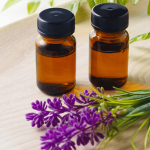Old and New Remedies for Digestive Problems
Lettuce, wild garlic, lesser celandine, patience dock, orach – spring entices us with its array of herbaceous plants (as the botanists call them), or greens (as we, common consumers, call them). Not to mention the bright radishes, which add a special touch to any entrée. You can not resist them and you should you not even try, for they are, all and each of them, genuine health bombs. The trouble is that this health infusion may come with “side effects”: gas, abdominal pain, bloating. Luckily, we have remedies of the same family: 100% natural!
Dr. Cristina Bălănescu, complementary medicine doctor, “combines” remedies from the fragrant pouches of local grandmothers with “imported” herbal medicine and aromatherapy products. This is proved by the very first plant she recommends us, as fennel is nothing but the French-flavor relative of the local dill.
Fennel seeds
A highly valued carminative plant (it helps solving gas problems), fennel may be taken as such (1-2 grams of seeds, three times a day) or as an infusion (pour 200 ml of boiling water on 1 teaspoonful of seeds and let it steep for 10 minutes).
Mint, savory and lemon balm
Use a pinch of powder from each plant: mint, to improve digestion; savory, to reduce bloating; lemon balm, to fight spasms. Steep in 200 ml of boiling water for 10 minutes. Filter and drink two cups a day between meals.
Rosemary
Steep 50 mg of rosemary in a liter of boiling water for 15 minutes, let it cool and drink the entire amount after each main meal. This tea speeds up digestion, burning especially animal fats, and reduces bloating and flatulence. Due to its antibacterial and antiseptic properties, it is also highly effective in fighting off intestinal infections.
Essential oils, working as a team
Basil, tarragon and cumin – the essential oils extracted from these plants are able to reduce the unpleasant sensation of bloated abdomen and abdominal cramps. Mix a few drops into vegetable neutral oil (jojoba or olive oil) and massage your abdomen using large circular movements. Relaxation guaranteed!
Homeopathic remedies
If we want to know which homeopathic remedy will solve the problem, first we must locate it. So:
bloating above the belly button generally occurs when we “swallow” too much air and vanishes if we take two tablets of Carbo vegetalis 5 CH three times a day;
when it occurs below the belly button, bloating is caused by intestinal gas; in this case, the therapist will recommend two tablets of Lycopodium 5 CH three times a day;
when bloating is located in both areas, the treatment will consist of China Rubra 5 CH (used in the same manner as the above-mentioned remedies);
finally, if you feel bloated all the time, you eat too fast and the abdominal discomfort gets worse when you eat sweet foods, you need to take two tablets of Argentum nitricum 9 CH 3-4 times a day.
For more information on how homeopathy works against imbalances and diseases in general and how it can improve our health are available in Samuel Hahnemann’s classic “Organon of Medicine”.
Sodium bicarbonate
Praised by grandma, who inherited the secret from her own grandma, baking soda is a “classic” of the remedy cupboard in every home, since it has proved its abilities when it comes to slow digestion, bloating and stomach acidity. How do you take it? Just as grandma used to say: a tablespoon of baking soda mixed in a small glass of water before each meal. Caution: people suffering from heart or kidney failure should not use it very often.
Clay
Clay-based digestive protectors are also an old, yet topical remedy: they protect the gastro-intestinal mucosa, absorb gases, quench heartburn. Mix one teaspoon of powder clay in a large glass of water, leave it for a few hours and drink only the clear water, before each meal. Caution: this remedy may decrease the absorption of other drugs, so if you are under medical treatment, you should talk to your doctor before you start using clay water.
Vegetable charcoal
This substance is the reference absorbing molecule resulting from high temperature burning of plant debris (cherry-tree wood, walnut-tree wood, apple wood, coconuts, olive stones etc.). It absorbs gases, food additives, pesticide residues or toxic bacteria and then removes them all from the body. That is why it is used in detoxification treatments. However, you should be careful with vegetable charcoal, too: like water clay, it may decrease the absorption of other drugs, so you must ask your doctor how many hours you should wait between taking your day-to-day pills and using your anti-bloating remedy.
Yeast
It restores the balance of intestinal flora, which is why it is recommended mainly when bloating is associated with rapid intestinal transit. The recommended daily amount is one lump the size of a walnut. The only inconvenience is that it may trigger an allergic reaction in allergy-prone people. However, reported cases have been rare.
Enjoy your seasonal greens!

Old and New Remedies for Digestive Problems by Technology for life is licensed under a Creative Commons Attribution-NonCommercial-NoDerivatives 4.0 International License.

 Previous Post
Previous Post Next Post
Next Post



